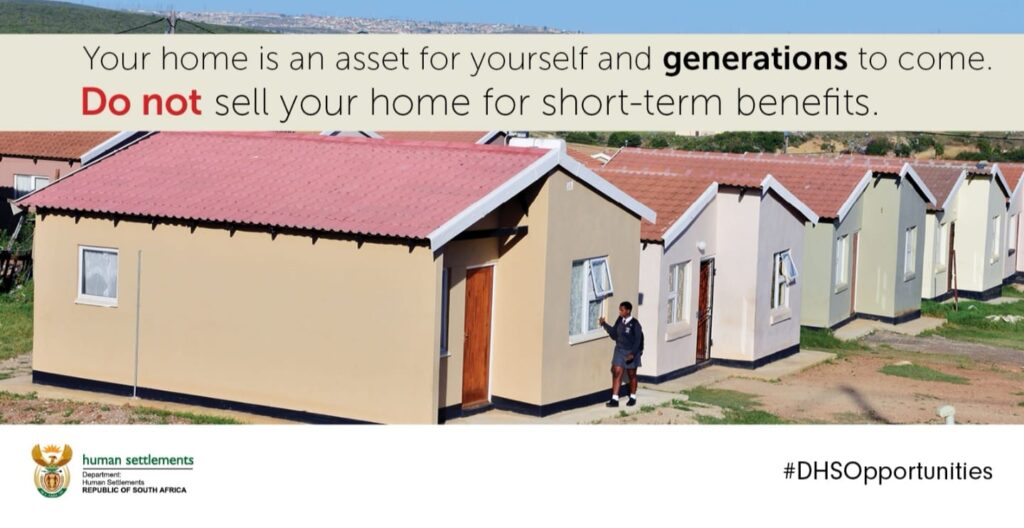RDP Housing Questions and Answers (FAQ’s)
After the 1994 elections, the new democratic South African government established various strategies and programmes to correct the structural oppression many faced during apartheid. One of these programmes was the Reconstruction and Development (RDP) programme, aimed at providing adequate social services to previously disadvantaged citizens by allocating tax money to development projects.
The main aim of these strategies and programmes were not only to eliminate poverty, but also promote a macroeconomic environment that is profitable.
To date, the South African government still has many obstacles to overcome (like notorious corruption), however it is still working towards an increased provision of housing to many disadvantaged South Africans.
The Department of Housing has confirmed that more than 3 million RDP houses have been built and have benefited up to 20 million people.
Who qualifies for RDP Housing?
The main goal of RDP housing is to replace informal settlements (“shacks”) that are found in many townships and provide low-income individuals with an adequate quality of life. All government subsidiary (RDP) houses are owned by its beneficiaries and are not a rental agreement.
As we mentioned in our previous article where we talked all about RDP Housing, these are the criteria applicants need to meet in order to apply for an RDP house:
- Applicants must be a South African citizen
- Applicants must be 21 years or older
- Applicants must be contractually capable (mentally able to sign a contract)
- Applicants must be married OR habitually live with a partner OR be single and have financial dependents
- Applicants must earn less than R3500.01 per month (per household)
- Applicants must be a first time government subsidiary recipient
- Applicants must be a first time home owner
RDP Housing is also available to single Military Veterans without financial dependent.
What is the value of an RDP house?
The cost of an RDP house varies depending on which location it is in. This is because construction costs will differ from one province and/or municipality to another.
Can a person legally buy a RDP house?
An RDP house can only be sold once the owner and buyer has received written consent from the municipality and have lived in the RDP house for at least 8 years. Owing to it being government subsidiary housing, it is illegal to buy or sell RDP houses without permission.

Can I build onto my RDP house?
If you would like to make alterations or renovations to your RDP house, you will need approval from your City Council – if you build without the proper approval, you can be fined and the structure you built may be demolished.
Find out how to apply for an RDP House here
What is the budget for RDP housing?
As of 1 April 2023, the department’s housing programmes will be adjusted as follows:
- Breaking New Ground (BNG) services and top structure will increase to R255 364 (from R196 887)
- Houses for persons with disabilities will increase to R271 166 (from R209 071)
- Houses for military veterans’ will increase to R312 069 (from R240 607)
- First Home Finance will increase R169 265 (from R130 505)
- Social housing will increase R424 984 (from R327 667)
Can you rent out an RDP house?
Once the homeowner has received the keys and the deed for the property from the housing department, they become the owner. However, this does not mean that they can rent out their RDP house. Renting out an RDP house is illegal as it may not be used to generate a source of income.
What happens to the RDP house after the owner has passed away?
If the owner of an RDP house passes away, the beneficiary stated in their legal will and title deed will then receive the property. However, if the deceased owner did not leave a will, the provincial Housing Department will then give the home to the owners dependents who can stay in the property until they purchase their own homes.
What happens to an RDP house if a partner’s divorce/ split up?
Usually, both partner’s names are on the application forms of the Department of Housing’s database. If you are living in an RDP house and you and your partner split, the court will then determine what will happen to the house thereafter.
If you are on the waiting list for an RDP house, can you apply for housing in another province?
In short, the answer is yes. However, it is important to remember that you will only receive a housing subsidy once. If you have not received an RDP house yet, you may then apply anywhere in South Africa.
If you do apply in another province, you will need to wait your turn again in the new area as each province/ municipality has their own unique waiting list.
Do disabled people qualify for RDP housing?
Yes. The municipality gives preference to beneficiaries living with disabilities as they are essentially in greater need. Disabled beneficiaries also received the benefit of their houses being adapted to their needs.
READ ABOUT: Types of grants
SRD R350 Grant Care Dependency Grant Child Support Grant Foster Child Grant Disability Grant Older Persons Grant Grant-In-Aid War Veterans Grant
Types of Grants How to Apply Status Check Payment Dates Jobs & Vacancies Updates & Blog Contact SASSA
QUERIES AND CONTACT
For any further queries, please contact SASSA directly:
Contact the SASSA Toll Free Call centre on: 0800 60 10 11
Contact the SASSA Head Office on: 012 400 2322
Email SASSA Head Office at: Grantsenquiries@sassa.gov.za
Contact details of SASSA offices across the country: SASSA contact details
